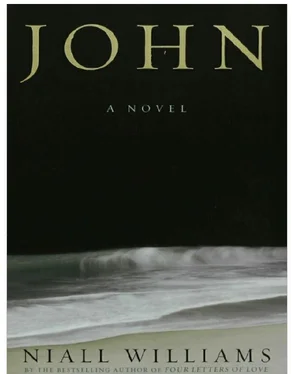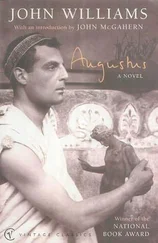It has gone well, Matthias thinks. He has taken the step and none have spoken against him. Why should they? Why would his word not be as another's? Why believe one and not he? Belief is not a lamb but a sword. It must be seized and then wielded. We are not shepherds but soldiers. The Romans have already shown what comes of shepherds. The Christians will be wiped out, banished or crucified, until they dwindle away to nothing, confined to the pages of annals where the scribes record the bizarre heresies of the ages. The Children of the Lamb will rank alongside Followers of the Sacred Goat, Disciples of the White Dog. It is the Jews and the Romans who will write the history. In more wise times the truth of the Divine Mind will be understood, and those who have touched it will be honoured as sages. To think of God as a man was a man's creation. Only a man could have the conceit of thinking God was himself, was like a father who sent down his son. No, God was not like a man, nor did he have a son. He is called the Father only so that the simpleminded might understand. And then they took it as the Word. The Father, the son! Childish ignorance. The truth of the Divine Mind was beyond them. God is a spirit, even Jesus had said, and must be worshipped in spirit, but they had not understood. Of course not. Clamour of the blind: What about our temple? What about our high priests and elders? Who will pay the temple taxes? Ignorance of sheep. Yes, sheep, apt.
But here, these are different. These are hungry to see God. They are tired of waiting for the promised return. What is Jesus to them? A story. They never saw him. They have only the word of a blind old man who forgets more every day and soon will not be able to remember his own name. What then of his promise? What credence in a man who will dribble his food and smell of his own waste? No. They were ready to hear. I knew it. When I told them Jesus was only another of many teachers, many who had understood the Divine Mind, I could feel ground fall away in their minds. A whole shelf of faith without foundation falling into nothing. Their love for him is deep, but not so well founded that it is strong. He becomes whatever they want him to become. Now he is fierce, now gentle, now damning the tax collectors, now forgiving all. A convenient god. The kind a man might invent for himself. But I knew to leave him his place in their minds. Continue to pray to him. O, yes. O, a great teacher. A wise teacher. But misunderstood.
The Divine Mind is like the sky that covers the world, I told them. A good picture. A simple one to understand. It is over everything and everyone.
Perhaps Baltsaros doubted most. Perhaps at first Cyrus. But the reverence of the others swayed them. How perfect this boat, too. The setting. Already we were freed from the prison of Patmos and its prisoned thinking. How easily is loyalty won when the disciples believe they have been chosen! The select. Sitting either side of the fishing boat and swelling with their own importance. Realising they are the younger, the stronger, that I have chosen none of the elders. Soldiers, not shepherds. And proud ones.
Flattery moves all things.
'I have chosen you amongst all others. As yet tell none what we alone know and what I have spoken here. Your ministry will follow when the hour is at hand.'
How the words sat like doves in my hands. How else but I am guided by the Divine?
The sea pitches and heaves and Matthias must sit. Still the dark smoke rises above the fisher's hut. The sky is weighted with stones of storm. The pilot takes them to the shallow waters, and those in the prow step gingerly overboard, hold firm the boat. One offers Matthias his hand, and he alights without word or gesture, walks from them across the stony underwater, and stands, looking at the distance as though he hears things told. The disciples come up and attend, their faces pale with soft bliss of meditation.
'I will send word,' Matthias says. 'We will sail again to speak of these things. Go. Go and consider the truth I have told you.'
He turns from them, walks up the pebbled shore with swift purpose. Something has happened. The clouds build on each other still. The air is cooler by the moment. As he ascends the rough stone steps in the cliff-way two at a time, he has a sour twist in his stomach. What is it? What has happened? Wind is turning like a mind; it spikes the scent of burning through all.
When Matthias reaches his dwelling, Auster is slumped before it. The disciple is exhausted and dirtied, the side of his face stained with blood. He does not rise. He does not tell Matthias what he has seen, nor that he was impelled after to set fire to the fisher's hut and leave the bodies to burn. He has not the strength, nor the knowledge even of how. How did he decide? How one moment was Auster outside and Papias awakened, breathing in moans on the floor, then how was Auster entering and seeking the lamp oil and setting the blaze? How? He cannot say. The flames kissed him. He did not run out. He stood in the swift devouring, the whoosh of the fire opening its mouth, its hot tongue taking the woman Marina like a blistered fish skin. Auster had stood too long, mesmerised by what was released there. Too long blinking at the wild smoke, breathing its blackness, until scorch and choking ran him outside. He had flung himself forwards on to the stones, retching. The roof caught. Creak and collapse, snarl, hiss, crackle: the fire ate at all. Then Auster, blur-eyed, throat-burned, coughing at the black gagging that kept him from air, stood, and for reasons he cannot explain, re-entered. To be himself taken by the flames? To allow the fury of the fire to devour him, too? He cannot say. Nor can he yet tell what he saw then. How the fire danced around the walls, how it took all but did not touch the fallen figure of Papias. He cannot tell this yet, nor how he came back to himself in that black place and stooped down to lift the youth up on to his back and brought him from there all the way across the island here to the dwelling of Matthias.
None of this can Auster say yet. He is slumped forwards, like a beast of burden heavily used.
'What is it? What has happened?'
'Papias,' Auster mutters and raises a hand to indicate.
Matthias steps past him into the dwelling. There Papias lies, blackened and blood-faced, but breathing still.
In the small grove of the olive trees is the stranger. Early sunlight plays. From branch to branch birds engage and dart, quickened in the light. The first pale olive leaves stir with emergence, the minor rustle as a bird exits a tree and crosses with swooping flight to another, the morning otherwise still. Tranquil, his back turned, the stranger stands. His feet are unshod, his robe the brown of a gardener. So moveless and silent is he, the birds take no notice and cross the grove singing the new day.
The light is the light of early summer. It cradles the scene, makes of the trees and their undershade a haven.
How he himself comes there, John does not know. He has walked from nowhere but is at the edge of the grove, branches overhead not yet fruited but leaf-heavy and stirring in wind he did not know was there. There is a scent out of old Galilee, a perfume of olives and dust baked in sun. He handles the tough bark of the trees, touching as he passes. The light he sees. How it falls between the trees. How all is balanced, light and dark, as he steps forward. The birdsong is life-full, pulsing. The stranger he knows, even from distance, even though his back is turned. He knows because of how the world is about him. He knows because of this condition of stillness, about him the createdness of things, how in the stranger's company all seems of one purpose, from the smallest leaf-move in unfelt wind to the traverse of a bird, from the patterned fall of sunlight to the pooled shade beneath. In this company he feels all is intent. Nothing is but what is intended. All has been made. And as John walks forward, he feels the deep solace of this, the knowledge he has almost forgotten that he is loved.
Читать дальше










